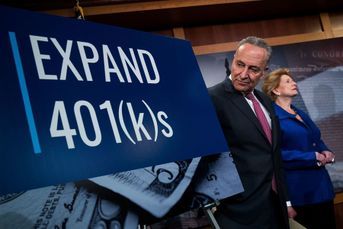The Department of Labor’s fiduciary rule: Where are we now?
The Trump administration has issued a proposed regulation to delay the applicability date of…
The Trump administration has issued a proposed regulation to delay the applicability date of the Department of Labor’s fiduciary rule. That will almost certainly be followed by a final rule that delays the date until June 9, 2017.
During that delay, the DOL is likely to determine that the fiduciary rule limits investors’ access to advice and/or increases the cost of advice. That means the DOL will need to either modify the rule or kill it. Either way, there will be an extended period of uncertainty.
Even with that uncertainty, and regardless of the outcome, we know one thing: The old fiduciary definition continues to apply to advice to retirement plans, participants and individual retirement account owners until a new rule is adopted. That means this is a good time to revisit the original regulation, as set by the Employee Retirement Income Security Act of 1974.
The rule has five parts, or requirements, for an adviser to be a fiduciary. It is a functional test, so it doesn’t matter what the adviser says, but instead focuses on what the adviser does. Here’s the five-part test:
• The adviser makes a recommendation about investments (including insurance products) or investment strategies or policies.
• There is a mutual understanding between the adviser and the investor.
• The understanding is that the recommendation will be a primary basis for investment decisions.
• The advice is provided on a regular basis.
• The advice is individualized and based on the particular needs of the investor.
Let’s look at the old rule as it applies in three scenarios: investment recommendations to 401(k) plans, investment recommendations to IRAs, and recommendations to participants to take plan distributions and to roll over to IRAs.
Investment recommendations to 401(k) plans
Under the old rule, it’s possible that in many cases investment recommendations to 401(k) plans are viewed as fiduciary advice.
Applying the requirements using the old definition, an adviser makes recommendations about investments; the adviser and the plan fiduciaries likely have a mutual understanding that the recommendations are to be a primary basis for decision-making; and the recommendations are tailored to the plan (i.e., individualized). And, since most 401(k) advisers meet with the plan fiduciaries either quarterly or annually to discuss the plan’s investments, the advice is given on a regular basis.
As a result, with an increased awareness of the old rules (due to ongoing discussion about the new rules) it is likely that more advisers will either acknowledge fiduciary status or work with record keepers that have platform fiduciaries who recommend and monitor the investment lineup.
Investment recommendations to IRAs
Investment advice to IRAs falls into two categories: those where there aren’t any financial conflicts of interest and those where there are.
The first category consists of advisers who provide ongoing investment advice for a level fee. This is the classic independent RIA model, but some dual-registrant broker-dealers will be adopting it as well, at least for certain types of investments.
A level-fee adviser earns only his/her fee, and neither the adviser nor any affiliate receives any other compensation (e.g., no commissions, 12b-1 fees, revenue sharing, income from affiliated products). In that case, there isn’t a prohibited transaction. The adviser is regulated by the fiduciary standard for RIAs under the securities laws, rather than the DOL’s best-interest standard.
The second category is where the compensation of an adviser and affiliates does not satisfy the definition of level-fee advice. In that case, there may be commissions, revenue sharing or other kinds of payments (e.g., management fees for proprietary funds). If so, and if the adviser is a fiduciary, those payments are prohibited transactions, since the adviser is receiving payments from third parties and/or affecting the amount of compensation for the adviser or affiliates. An exemption is needed.
In many cases, advisers to IRAs will not be fiduciaries as defined in the old rules. For example, an adviser recommends that an IRA owner buy a mutual fund, but then does not provide ongoing investment advice, and the advice is not given “on a regular basis.” On the other hand, if the adviser meets with the IRA owner each year and makes recommendations about rebalancing, removing and replacing mutual funds, and so on, that would likely satisfy the “regular basis” requirement.
However, IRAs (other than SEP and SIMPLE IRAs) are covered only by the Internal Revenue Code, rather than ERISA as well, and the code doesn’t have a fiduciary standard of care. (In other words, it only prohibits certain financial conflicts of interest arising from fiduciary recommendations — for example, recommendations that generate commissions for the advisers.) So, FINRA and the SEC determine the standard of care for an adviser with a broker-dealer.
In addition, only the IRS can enforce the Code; as a result, IRA owners don’t have private causes of action to enforce the code’s prohibitions.
Recommendations of plan distributions and IRA rollovers
This issue is more complicated. Since full explanation would require its own article, for the moment, let me say that in most cases an adviser’s recommendation to take a plan distribution and roll it over into an IRA is not a fiduciary act under the old regulation. Instead, the recommendation will — until we have a new rule — only be subject to the suitability standard.
So, for the moment, we go backwards to the future, in the sense that the old rule still defines fiduciary advice. But, more attention will be given to the old fiduciary rule and how it applies to current advisory practices.
Fred Reish is a partner at the law firm Drinker Biddle & Reath.
Learn more about reprints and licensing for this article.







